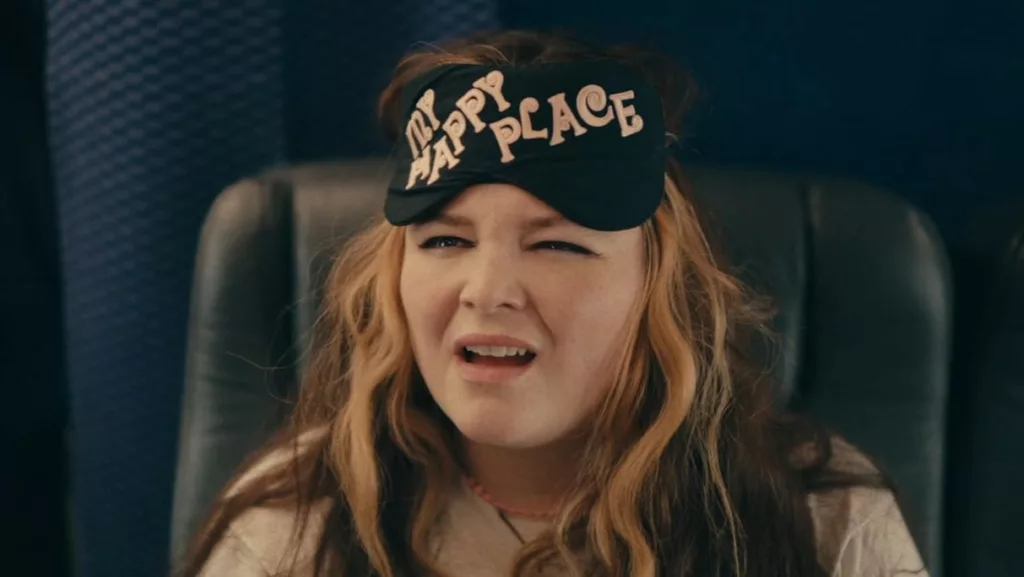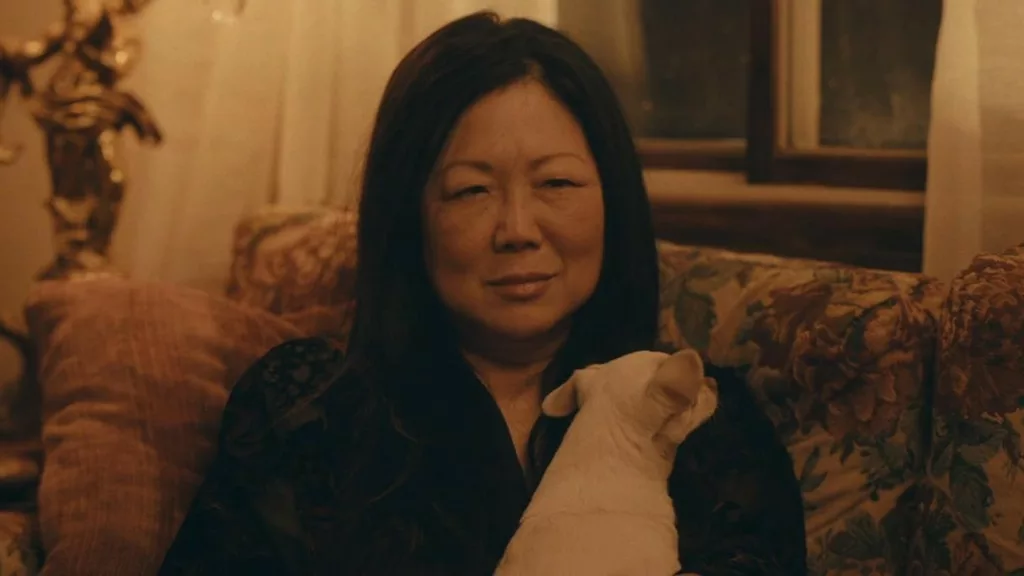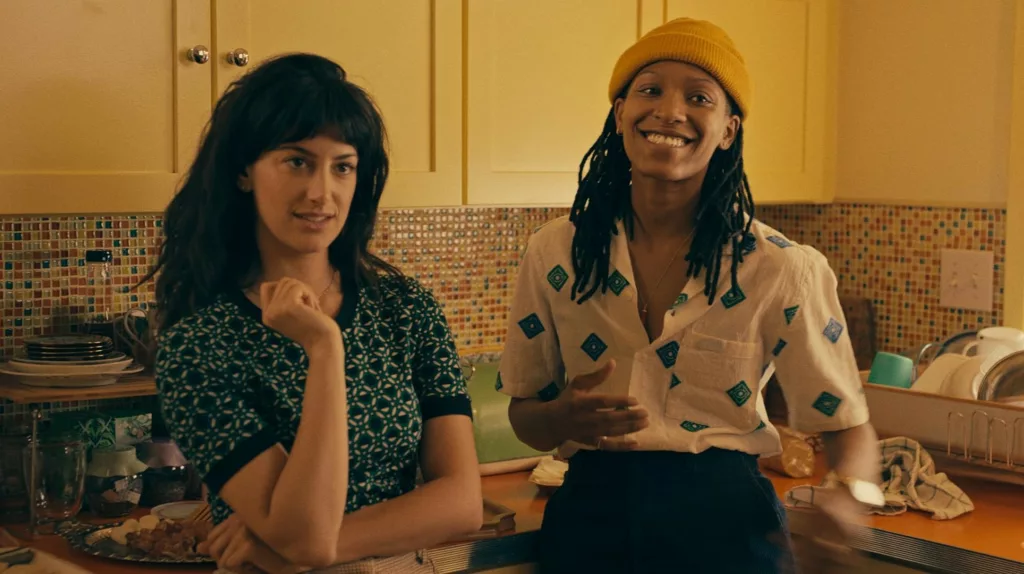Cora Bora offers a refreshing take on the journey of self-discovery with its portrayal of troubled musician Cora. Helmed by director Hannah Pearl Utt and featuring a breakout lead performance from comedian Megan Stalter, this Sundance selection explores what happens when a free spirit hits rock bottom in her romantic relationship and creative pursuits.
Cora moved to Los Angeles, hoping to make it big in the music industry. But she now finds her solo career stalling and her long-distance girlfriend slowly drifting away. In a desperate bid to rekindle their romance, Cora makes an impulsive trip back to her Pacific Northwest hometown of Portland. What begins as a quest for a second chance soon devolves into a chaotic string of awkward encounters and questionable decisions.
Through it all, Stalter imbues Cora with nuanced layers of humor, vulnerability, and tenacity. Behind the brash lyrics and aloof persona lies a fragile heart still healing from past wounds. As Cora cycles through cringeworthy escapades, Stalter ensures we empathize with her struggle to process failures and reconnect with loved ones, conveying psychological depth beyond the antics. With a strong supporting cast, including Manny Jacinto, the film blossoms into a moving portrayal of messy humanity.
Cora Seeks Solace in Portland
Cora’s solo music career has yet to find its footing in Los Angeles. Playing in half-empty rooms, her songs don’t resonate as she hopes. Relationship troubles don’t help clear her mind. Though dating Justine from afar, phone calls have turned patchy between Portland and LA.
Sensing a shift, Cora impulsively flies north, seeking clarity. What she finds is an unwelcome surprise: Justine has moved on with Riley. Yet for Cora, the comforts of the past die hard. At Justine’s graduation party, she inserts herself as if their romance remains.
Misreading cues, her missteps turn comic. Mistaking Riley for a housekeeper, Cora’s claim that she and Justine remain close seems sad rather than sincere. A well-meaning friend, Tom, becomes a solace, though connecting means facing feelings long stifled.
Days unfold turbulently. Cora butts heads with her former partner, trailing chaos through their college crowd. A lost dog brings its own havoc, and through it all, Tom remains her lighthouse. His patience and care aid Cora as self-doubts rise with the past’s shadows.
Seeking music’s purpose, Cora finds relationships offer deeper notes worth exploring. Her blend of vulnerability and spirit starts to resonate if she can listen within as keenly as without. In Portland’s familiar settings, might solace emerge from confronting what she fled and where her heart might yet lead?
Finding Yourself in Cora
Megan Stalter proves herself more than ready for the leading role in Cora Bora. While many first came to appreciate her scene-stealing abilities in Hacks, this film shows off an even greater depth in her skills.
Cora easily could have been a one-dimensional mess, but Stalter ensures she feels as real as any friend we’ve watched stumble through life’s challenges. She nails Cora’s brash confidence, which hilariously disguises deep-seated doubts. During songs, this peeks through with self-deprecating lyrics like “Dreams are stupid, and so are you for believing in them.”
Some of the most impactful moments see past Cora’s surface. When an abrupt hookup cracks her facade, Stalter poignantly captures the vulnerability behind bravado. She expresses everything Cora holds inside: regret, longing, and fear of being alone. Later, learning of Cora’s tragic backstory, it’s Stalter’s expressive abilities that help us understand how it shaped her.
Time and again, Stalter locates new layers in this character. Whether deflecting awkward situations or tentatively opening up, her subtlety makes each change in Cora feel genuine. Even in small scenes, like reassurances from a kind stranger, Stalter amplifies Cora’s messy humanity.
By unfolding Cora with such care, Stalter lends the story meaningful depth. Her performance gracefully balances laughter and emotion. Ultimately, she brings to life a character that feels as complex as anyone finding their way through life. Stalter proves herself more than ready for the leading role in Cora Bora. While many first came to appreciate her scene-stealing abilities in Hacks, this film shows off an even greater depth in her skills.
Meet Cora: Messy Yet Human
Cora is certainly a walking mess. She drinks too much and smokes pot at all hours, dragging chaos with her wherever she goes. Her love life and music career are both floundering. Yet underneath her abrasive exterior lies vulnerability.
We first see Cora playing bitter songs in near-empty rooms, bemoaning how “dreams are stupid.” Her lyrics hint at past hurts. Though aloof, cracks emerge as the film progresses. When forced to reckon with trauma long dodged, raw emotions burst forth despite her.
Cora’s open relationship crumbles as her lover Justine falls for another. Seeing this, Cora flies home on a whim to reclaim what’s lost. What ensues are awkward encounters that induce both laughter and sympathy. We’ve all embarked on foolish missions of the heart.
Refreshingly, the film resists reducing Cora to just pain from her past. Yes, trauma shaped her. But it doesn’t define her humanity. Cora remains complex and contradictory, like all of us. Capable of selfishness yet longing for connection too.
Megan Stalter breathes life into Cora with nuance. She imbues her with charm despite all the cringe. We root for Cora not just because of what she endured, but because underneath lies resilience, spirit, and a willingness to grow, however bruised the journey may be.
Cora reminds us that none of us have it altogether, and that’s okay. Our worth isn’t tied to success or how put-together we appear. As imperfect as we are, we deserve love and the chance to rewrite our stories.
Cora’s Connections
While Megan Stalter shines as the witty yet wounded Cora, some of her relationships feel underdeveloped. Chief among these is Justine, her long-time girlfriend living back in Portland. Their history alone suggests rich veins of care, compromise, and change left mostly unexplored.
Justine comes across as exceedingly kind and patient. But her feelings about their drifting dynamic, or how she fell for the vibrant Riley, remain shadows. We see little of what first drew her to reckless but magnetic Cora. More flashbacks could have given their bond gravitas and added poignancy to its unraveling.
Elsewhere, the tender Tom risks becoming a mere quirk amid Cora’s misadventures. Though we credit his empathy, his past and what prompts it remain mysteries. Why does he indulge her rudeness time after time? Further shading his compassion could have deepened their will—will they or won’t they spark?
Not that the cast fails to ignite. Stalter links marvelously with co-stars, even in fleeting scenes. Her rapport with Ayden Mayeri sees the women sparing as rivals do—with fire yet respect. And Stalter shares delightful chemistry with Manny Jacinto, the two playing off one another with pitches ranging from zany to subdued.
All told, these artists offer moments that feel lifelike and true to multilayered people. One just wishes for more time with those close to Cora to strengthen attachment to her story and growth. But the opportunities ahead for these performers and their partners seem bright.
Through Vulnerability: A Journey of Self-Acceptance
Cora Bora follows Cora as she navigates, opening herself to the world. She shields deep hurt beneath snark and pretense, afraid to acknowledge her emotional fragility. Throughout humorous yet relatable moments, Cora slowly emerges from her cocoon.
Cora’s sexuality brings judgment from others, yet the film embraces her fluidity with compassion. Her Portland adventures reflect queer experiences of feeling othered yet longing for community. When spurned by others, Cora connects with an enthusiastic polyamory group. Despite initial unease, she finds caring acceptance—a rare comfort.
Cora doubts her talent yet clings to music desperately. Her performances showcase resignation through lyrical wit. “Dreams are stupid,” she sneers, her protective guard firmly up. As setbacks mount, Cora questions everything yet refuses to accept outside truths. A meaningful partnership with accomplished artist Miya Folick lends Cora’s journey poetic resonance.
Cora’s return to Portland sparks complex feelings. Faced with Justine’s new love, Cora grasps for control through bravado. Beneath Barbs, her care for Justine remains profound. Their history together speaks to LGBTQ+ relationships severing yet staying deeply felt. Tom’s kindness cuts through Cora’s brusqueness, seeing her softer qualities. His patience shows that healing comes through compassion.
By baring painful secrets, Cora accepts her strength and vulnerability as intertwined. Her closing performance transforms resigned blues into hopeful folk-pop. In finding self-worth beyond others’ judgments, Cora discovers her voice anew. Her story uplifts by proposing that through openness and human fellowship, even ‘broken’ souls may become whole.
A Welcome Showcase for Talent
Cora Bora proves an enjoyable romp, with Megan Stalter stepping fully into the spotlight. While the film has its uneven patches, Stalter’s wit and vulnerability shine throughout.
As the messy yet endearing Cora, she brings the character to life with sincerity. Under the barbed jokes and bravado lies a woman wrestling with past hurt. Stalter taps into both Cora’s comic sensibilities and simmering emotion. She excels in those tender moments the role demands.
The film rightly keeps Cora at the center. She drives her haphazard adventures in Portland as she seeks connection and closure. Cora’s messy journey echoes the experiences of many navigating life and love. Stalter ensures the character’s flaws feel authentic and her heart genuine.
Cora Bora highlights Stalter’s range and star power. She commands attention in a leading role that plays to her strengths while pushing her range. The comedian proves equally gifted with both belly laughs and soulful subtlety.
While the supporting characters could use more depth, the film achieves its aim of spotlighting Stalter. In doing so, it offers an enjoyable showcase for her talents. Her wit and sincerity leave no doubt that much more is on the horizon for this rising star. Cora Bora presents the charming introduction of a comedian with great versatility and potential for continued success.
The Review
Cora Bora
Cora Bora is an enjoyable, albeit uneven, feature showcase for star Megan Stalter. While the supporting characters lack dimension, the film effectively centers Stalter as its flawed yet charming lead. Her nuanced performance demonstrates her considerable range and promise for future leading roles. Overall, Cora Bora entertains more than it stumbles, driven by Stalter's commanding screen presence.
PROS
- Megan Stalter's starring performance as Cora
- A relatable depiction of Cora's struggles with relationships, career, and personal growth
- Humorous and awkward scenarios that showcase Stalter's comedic abilities
CONS
- Underdeveloped supporting characters
- The plot feels scattered with frequent introductions of new characters.
- Uneven tonal shifts between comedy and drama





















































